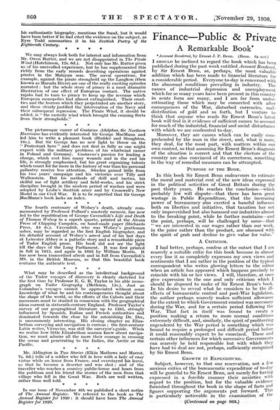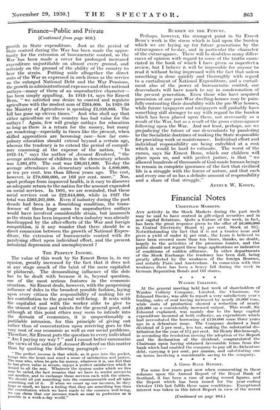Finance—Public & Private
A Remarkable Book*
*Account Rendered, by Ernest J. P. Benn. (Benn. Cs. net.) I SHOULD be inclined to regard the book which has been published during the past week entitled Account Rendered, by Sir Ernest Benn, as, perhaps, the most valuable addition which has been made to financial literature for a considerable period. Everyone to-day is concerned with the abnormal conditions prevailing in industry. The causes of industrial depression and unemployment which for so many years have been present in this country in acute form are many, and I am far from under- estimating those which may be connected with after consequences of the War, disturbed currencies, mal- distribution of gold and so forth, but I venture to think that anyone who reads Sir Ernest Benn's latest book will find in it evidence of sufficient causes to account for much of the industrial, financial and social disturbance with which we are confronted to-day.
Moreover, they are causes which can be easily com- prehended by the man in the street, and, what is more, they deal, for the most part, with matters within our own control, so that assuming Sir Ernest Benn's diagnosis of the situation is correct and that the electors of the country are also convinced of its correctness, something in the way of remedial measures can be attempted.
PURPOSE OF THE BOOK.
In this book Sir Ernest Benn endeavours to estimate the moral and material cost of the new ideas expressed in the political activities of Great Britain during the past thirty years. He reaches the conclusion—which probably few will dispute—that there has been great wastage in Public Expenditure, that the increasing power of bureaucracy also exerted a baneful influence both on liberties and initiative, that taxation has not only impoverished but also harassed our industries almost to the breaking point, while he further maintains—and the point, perhaps, will be challenged by some—that "we are interested in our wages rather than our work, in the price rather than the product, are obsessed with the spirit of grab and decline to give value for value."
A Carricism.
I had better, perhaps, confess at the outset that I am scarcely a* suitable critic for this book because in almost every line it so completely expresses my own views and sentiments that I am rather in the position of the typical correspondent who writes glowing letters to the editor when an article has appeared which happens precisely to coincide with his or her views. I will, therefore, at once give expression to the one and only criticism which I should be disposed to make of Sir Ernest Benn's book. In his desire to reveal what he considers to be the ill- effects of bureaucratic control and post-War legislation, the author perhaps scarcely makes sufficient allowance for the extent to which Government control was necessary during the War, and for a certain period following the War. That fact in itself was bound to create a position making a return to more normal conditions extremely difficult, and, similarly, the spirit of profiteering engendered by the War period is something which was bound to require a prolonged and difficult period before it could reasonably expect to be exorcized. These and certain other influences for which successive Governments can scarcely . be' held responsible but with which they have had to deal are not, perhaps, sufficiently recognized by Sir Ernest Benn.
GROWTH IN EXPENDITURE.
Subject, however, to that one reservation, not a few anxious critics of the bureaucratic expenditure of to-day will be grateful to Sir Ernest Benn, not merely for having expressed in a forcible manner their anxieties with regard to the position, but for the valuable evidence furnished throughout the book in the shape of facts and figures supporting the arguments put forward. This is particularly noticeable in, the examination of the .(Continued on page .883.) Finance—Public and Private
(Continued from page 860.) growth in State expenditure. Just as the period of State control during the War has been made the oppor- tunity for the extension of bureaucratic control, so the War has been made a cover for prolonged increased expenditure unjustifiable on almost every ground, and certainly on the ground of the ability of the country to bear the strain. Putting aside altogether the direct costs of the War as expressed in such items as the service on the enlarged National Debt and the War Pensions, the growth in administrational expenses and other national outlays—many of them of an unproductive character— has been simply appalling. In 1913-14, says Sir Ernest Benn, "we satisfied our desire to control and regulate agriculture with the modest sum of 1264,000. In 1929-80 the Ministry of Agriculture is spending £2,958,868. The bill has gone up eleven times." And who shall say that either agriculture or the country has had value for the outlays ? Again, few will grudge outlays for education so long as there is a return for the money, but many are wondering—especially in times like the present, when skilled apprentices are becoming rare—how far com- pulsory education should extend beyond a certain age, whereas the tendency is to extend the period of compul-
sory cramming- at the expense of the nation. In 1913-14," says the author of Account Rendered, "the average attendance of children in the elementary schools was 5,381,479. The cost was 130,011,000. To-day the average attendance in elementary schools is 4,890,000, or ten per cent, less than fifteen years ago. The cost, however, is £79,660,000, or 163 per cent. more." Nor, apart perhaps from improved health, is it easy to discover an adequate return to the nation for the amount expended on social services. In 1891, we are reminded, that these social services cost us 122,644,000, while in 1927 the total was £383,261,000. Even if industry during the past decade had been in a flourishing condition, the trans- ference of these huge sums to unproductive outlays would have involved considerable strain, but inasmuch as the strain has been imposed when industry was already handicapped by the after-effects of the War and foreign competition, is it any wonder that there should be a direct connexion between the growth of National Expen- diture, the extension of bureaucratic control with its paralysing effect upon individual effort, and the present industrial depression and unemployment ?
THE PERFECT INCOME.
The value of this work by Sir Ernest Benn is, in my opinion, greatly increased by the fact that it does not at any stage smack of the taint of the mere capitalist or plutocrat. The demoralising influence of the dole has to be dealt with because it is, beyond question, one of the most serious features in the economic situation. Sir Ernest deals, however, with the pauperising influence of doles in the broadest possible fashion, laying Upon every citizen the responsibility of making his ot- her contribution to the general well-being. It rests with the capitalist and with the worker alike to give to the utmost of time and talents for the general good, and although at this point ethics may seem to intrude into the domain of economics, it is unquestionably a Justifiable intrusion, for this principle of giving out rather than of concentration upon receiving goes to the very root of our economic as well as our social problems. Therefore, Sir Ernest puts the question to every individual 'Am I paying my way ? "and I cannot better summarize the views of the author of Account Rendered on this matter than by quoting the following paragraph :— " The perfect income is that which, as it goes into the pocket, brings into the heart and mind a sense of satisfaction and justice. The man who, when he gets his money, whatever it is, can feel that lie has given value in return, enjoys a perfect satisfaction which is denied to all the rest. Whatever the system under which we live may be called, the fact remains that we have to render service to one another, and to exchange those services each with the others. We should all put something into the commonwealth and all take something out of it. If when we count up our incomes, be they large or small, we have a feeling that they are something less than the contribution which we have made to the common well-being, we can claim that our incomes reach as near to perfection an is Possible in a work-a-day world."
BURDEN ON THE FUTURE.
Perhaps, however, the strongest point in Sir Ernest Benn's work is the stress which is laid upon the burden which we are laying up for future generations by the extravagance of to-day, and in particular the character of the extravagance. There will be doubtless many differ- ences of opinion with regard to some of the truths enun- ciated in the book of which I have given so imperfect a review, but I believe it will be impossible for anyone to read it without being impressed with the fact that unless something is done quickly and thoroughly with regard to a curtailment of National Expenditure, and a curtail- ment also of the power of bureaucratic control, our descendants will have much to say in condemnation of the present generation. Even those who have acquired possession of our post-War dwelling-houses may be pain- fully contrasting their durability with the pm-War houses, while future taxpayers and ratepayers will probably have something still stronger to say with regard to the burden which has been placed upon them, not necessarily as a result of the War, but as a result of the gross extravagance following upon the War. And not least, perhaps, are we prejudicing the future of our descendants by pandering to the Socialistic doctrines of making the State responsible for providing work or maintenance. Individual effort and individual responsibility are being enfeebled at a cost which it would be hard to estimate. The worst of the curses, says Sir Ernest Benn, which our children will place upon us, and with perfect justice, is that " we allowed hundreds of thousands of God-made human beings to remain in complete ignorance of the fact that civilized life is a struggle with the forces of nature, and that each and every one of us has a definite amount of responsibility and a share of that struggle."
ARTHUR W. KIDDY.











































 Previous page
Previous page